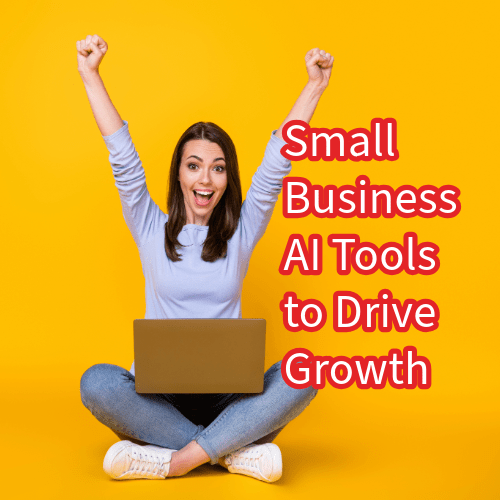
Small businesses are turning to Artificial Intelligence (AI) to stay competitive, optimize operations, and drive growth.
What was once the domain of large corporations with hefty budgets has now become accessible to smaller enterprises, thanks to advances in AI technology.
AI tools are cost-effective and enable small businesses to automate routine tasks, gain insights from data, improve customer engagement, and streamline decision-making.
Discover how small businesses can leverage AI tools to achieve sustainable growth, covering areas such as marketing, customer service, sales, operations, and finance.
Small Business – AI Tools to Drive Growth

- Enhancing Marketing Strategies with AI
Marketing is crucial for small businesses, and AI has revolutionized how businesses approach their audiences. AI-driven marketing tools help businesses personalize their messages, target the right customers, and measure campaign success more effectively.
Personalized Customer Engagement
AI tools like HubSpot, Mailchimp, and ActiveCampaign use machine learning algorithms to segment audiences based on behavior, preferences, and purchasing history.
By analyzing customer data, these platforms enable small businesses to deliver personalized email campaigns, product recommendations, and targeted advertisements, increasing conversion rates.

Content Creation and Optimization
Content is king, but creating high-quality content can be time-consuming. AI tools such as Copy.ai and Jasper help small businesses generate blog posts, social media updates, and product descriptions.
Additionally, AI-powered SEO tools like SEMrush and SurferSEO analyze keywords and competition, ensuring content ranks well in search engines.
Predictive Analytics for Better Campaigns
Predictive analytics tools like Pecan and H2O.ai allow small businesses to forecast customer behavior and market trends. By analyzing historical data, these tools help businesses make data-driven decisions about future marketing strategies, optimizing ROI.

- Transforming Customer Service with AI Chatbots
Providing excellent customer service is essential for customer retention, but it can be challenging for small businesses with limited resources. AI chatbots offer a scalable solution to handle customer inquiries efficiently.
24/7 Customer Support
Tools like ChatGPT, Drift, and Intercom provide AI-powered chatbots that can handle routine inquiries, process orders, and offer support. This ensures that customers receive responses, even outside of business hours.

Improving Customer Experience
AI chatbots can learn from interactions. With natural language processing (NLP), these tools understand customer sentiment and intent, providing personalized responses that enhance the customer experience.
Furthermore, they can escalate complex issues to human agents when necessary, ensuring seamless support.
Data Collection and Insights
AI-powered customer service tools collect data from every interaction, providing valuable insights into customer pain points and frequently asked questions.
This data can be used to refine products, improve services, and tailor marketing strategies.

- Boosting Sales Efficiency with AI Tools
Sales is the lifeblood of any business, and AI can enhance sales processes by automating lead generation, scoring, and nurturing.
Lead Generation and Scoring
AI-driven platforms like Salesforce Einstein, Zoho CRM, and Pipedrive analyze large datasets to identify high-quality leads and prioritize them based on possibilities to convert.
By automating these processes, sales teams can focus their efforts on the most promising opportunities, improving efficiency and sales.

Sales Forecasting and Strategy
AI tools such as Gong and Chorus.ai analyze sales calls, emails, and other customer interactions to identify patterns that indicate successful sales strategies.
These insights help sales teams refine their approaches, forecast future sales accurately, and adjust strategies.
Automated Follow-ups and Reminders
AI-powered tools like Outreach and Salesloft can automate follow-ups with prospects, ensuring communication without manual intervention. These tools also provide reminders for sales reps.

- Streamlining Operations with AI Automation
Operational efficiency is critical for small businesses to scale without increasing costs. AI-powered automation tools can handle repetitive tasks, freeing human resources for more strategic activities.
Inventory Management
AI tools like QuickBooks Commerce and Zoho Inventory use predictive analytics to optimize inventory levels. They analyze sales data, seasonal trends, and supplier performance to ensure businesses maintain optimal stock levels, reducing overstocking and stockouts.

Workflow Automation
Tools like Zapier and Make connect different software applications, automating workflows across platforms. For instance, AI can automatically transfer data from customer inquiries to CRM systems, generate invoices, or update project management tools like Trello or Asana.
Supply Chain Optimization
AI-powered logistics platforms such as Locus and ClearMetal optimize supply chain processes by predicting delays, optimizing routes, and managing demand fluctuations. This helps small businesses improve delivery times and reduce operational costs.

- Improving Financial Management with AI Tools
Managing finances effectively is crucial for small businesses and AI-powered tools can streamline budgeting, forecasting, and financial analysis.
Automated Bookkeeping and Accounting
Platforms like QuickBooks and FreshBooks have integrated AI to automate bookkeeping tasks such as categorizing expenses, reconciling transactions, and generating financial reports. This reduces the time spent on manual data entry and minimizes errors.

Expense Management
AI-powered tools like Expensify and Receipt Bank automate the process of tracking and managing expenses. They can scan and categorize receipts, flag anomalies, and generate expense reports, ensuring accurate record-keeping and compliance.
Cash Flow Forecasting
Tools like Float and Fathom use AI to provide real-time cash flow forecasting. By analyzing historical data, these platforms help small businesses predict future cash flow needs, enabling proactive financial planning and ensuring liquidity.
AI tools are essential assets that small businesses can leverage to drive growth.

Successful AI adoption lies in selecting the right tools that align with business goals, investing in training, and monitoring performance.
By harnessing the power of AI, small businesses can provide superior customer experiences and drive long-term growth.
AI Tools for You
https://www.bestprofitsonline.com/myblog/newai
Tip
How To Improve Your Social Media Marketing
